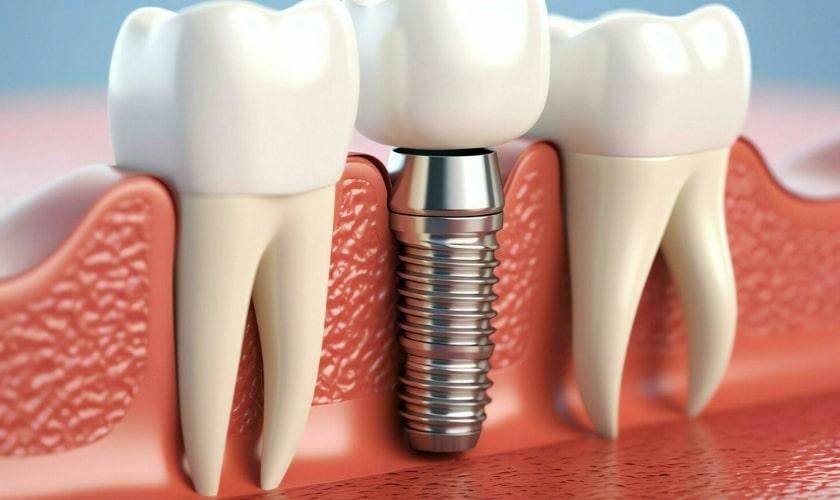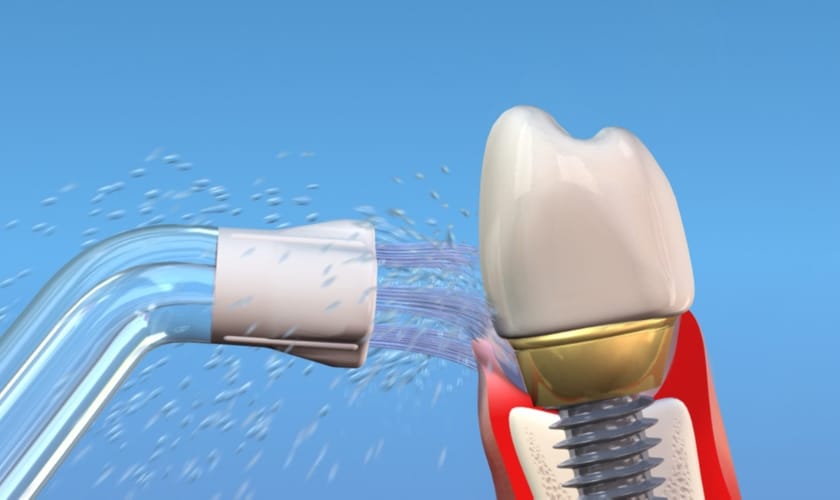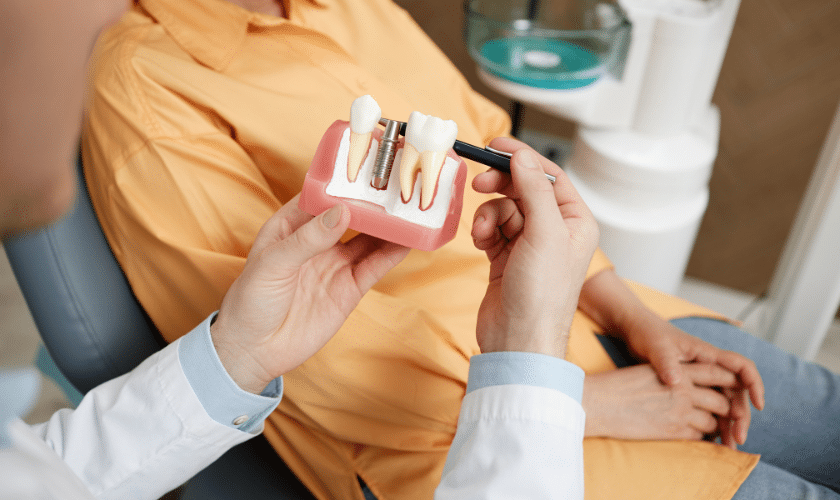Can Gum Disease Stop You from Getting Dental Implants?

Are you considering dental implants but concerned about how gum disease might impact your candidacy?
Understanding the relationship between gum health and dental implants is crucial for making informed decisions about your oral health. Dental implants are revolutionary in restoring missing teeth, offering a natural look and feel. However, the health of your gums plays a pivotal role in the success of this procedure.
Gum disease, also known as periodontal disease, can affect anyone and ranges from mild gingivitis to severe periodontitis. It’s not just a matter of oral discomfort; untreated gum disease can jeopardize the stability and longevity of dental implants.
In this blog, we delve into how gum disease can influence your eligibility for dental implants, what steps can be taken to address gum health issues, and what to expect during the consultation process.
Let’s explore how maintaining healthy gums is essential for achieving the smile you desire with dental implants.
Understanding Gum Diseases
Gum disease, also known as periodontal disease, affects the tissues surrounding and supporting your teeth. It progresses through stages, starting with gingivitis and potentially advancing to periodontitis if untreated.
Definition and Types of Gum Disease:
- Gingivitis: The earliest stage, causing red, swollen gums that may bleed easily.
- Periodontitis: Advanced stage where gums pull away from the teeth, forming infected pockets. This can lead to bone loss and tooth loss if not managed.
Causes and Risk Factors Associated with Gum Disease:
- Plaque Buildup: Sticky, bacteria-laden film that hardens into tartar.
- Poor Oral Hygiene: Inadequate brushing and flossing.
- Smoking: Major risk factor for gum disease.
- Genetics: Family history can increase susceptibility.
- Medical Conditions: Diabetes and other systemic conditions can contribute.
- Medications: Certain drugs reduce saliva flow, affecting gum health.
- Hormonal Changes: Pregnancy, menstruation, and menopause can make gums more sensitive and prone to disease.
Impact of Gum Disease on Dental Health
Gum disease significantly affects your oral structures, leading to various complications if left untreated. It not only impacts your gums but also affects your teeth and supporting bone structure.
How Gum Disease Affects Oral Structures:
- Gums: Inflammation causes redness, swelling, and bleeding.
- Teeth: Gum disease can lead to loose teeth and eventual tooth loss.
- Bone: The supporting bone may deteriorate, reducing support for teeth.
Potential Complications If Left Untreated:
- Tooth Loss: Advanced gum disease leads to the loss of teeth, affecting your ability to chew and speak.
- Receding Gums: Gums pull away from the teeth, creating pockets that harbor bacteria.
- Bone Loss: The jawbone can deteriorate, making it challenging to place dental implants.
- Infections: Untreated gum disease can result in severe infections that may spread to other parts of the body.
- Systemic Health Issues: Linked to heart disease, diabetes, and respiratory problems.
Requirements for Dental Implants
Dental implants offer a permanent solution for missing teeth, but not everyone qualifies for this treatment. Specific criteria ensure the success and longevity of dental implants.
Criteria for Candidacy for Dental Implants:
- Overall Health: Good general health is essential. Chronic illnesses like diabetes and heart disease must be controlled.
- Age: Suitable for adults; children and teenagers must complete bone growth.
- Oral Hygiene: Commitment to maintaining excellent oral hygiene is crucial.
- Non-smokers: Smoking hinders healing and increases the risk of implant failure.
Importance of Healthy Gums and Bone Structure:
- Gum Health: Healthy gums provide the foundation for implants. Gum disease must be treated before proceeding.
- Bone Density: Adequate bone density ensures implant stability. Bone grafting may be necessary if bone loss has occurred.
- Jawbone Integrity: A strong jawbone supports the implant. Bone quality and quantity directly affect implant success.
Effect of Gum Disease on Dental Implant Success
Gum disease significantly impacts the success rate of dental implants. Healthy gums provide the necessary support and stability for implants, but gum disease can compromise this foundation.
How Gum Disease Can Affect the Success Rate of Dental Implants:
- Inflammation and Infection: Gum disease causes inflammation and infection, which can hinder the healing process and integration of the implant with the bone.
- Bone Loss: Advanced gum disease leads to bone loss, reducing the available bone to anchor the implant securely.
- Gum Recession: Receding gums expose the implant, increasing the risk of infection and implant failure.
Risks and Challenges Associated with Placing Implants in Diseased Gums:
- Poor Healing: Infected gums heal poorly, delaying recovery and increasing complications.
- Implant Failure: Diseased gums lack the strength to support implants, leading to higher chances of implant loosening or falling out.
- Peri-Implantitis: Gum disease increases the risk of peri-implantitis, an infection around the implant that can cause bone loss and implant failure.
Treatment of Gum Disease Before Dental Implants
Treating gum disease before dental implant placement is essential for ensuring a successful outcome. Proper treatment and care can restore gum health and create a stable foundation for implants.
Preparatory Treatments for Gum Disease:
- Professional Cleaning: Deep cleaning procedures, such as scaling and root planing, remove plaque and tartar from below the gum line.
- Antibiotic Therapy: Antibiotics help reduce bacterial infection and inflammation in the gums.
Steps to Improve Gum Health Prior to Implant Placement:
- Regular Dental Visits: Routine check-ups and cleanings help monitor and maintain gum health.
- Good Oral Hygiene: Brushing twice daily, flossing, and using mouthwash can prevent plaque buildup and inflammation.
- Healthy Diet: Eating a balanced diet rich in vitamins and minerals supports gum health.
- Quit Smoking: Smoking cessation improves blood flow to the gums, enhancing healing and reducing infection risk.
- Gum Surgery: In severe cases, surgical procedures like flap surgery or grafts may be necessary to restore gum and bone health.
Consultation and Evaluation Process
A thorough consultation and evaluation by a dentist or periodontist is crucial before considering dental implants. Professionals need to assess your gum health and overall oral condition to ensure a successful implant procedure.
Importance of Thorough Evaluation:
- Comprehensive Exam: Dentists perform a detailed examination of your mouth, teeth, and gums to identify any issues.
- Medical History Review: Understanding your medical history helps identify conditions that might affect implant success.
How Professionals Assess Gum Health and Suitability for Implants:
- X-rays and Imaging: X-rays and 3D imaging provide a detailed view of your bone structure and gum health, helping to identify any underlying problems.
- Periodontal Probing: This measures the depth of gum pockets to assess the severity of gum disease.
- Bone Density Analysis: Adequate bone density is crucial for supporting dental implants. Dentists evaluate bone levels to ensure they are sufficient.
- Oral Hygiene Assessment: Dentists review your oral hygiene practices and may recommend improvements to ensure a healthy environment for the implants.
- Customized Treatment Plan: Based on the evaluation, dentists create a tailored treatment plan to address any issues and prepare your gums for implants.
Gum disease can significantly impact the success of dental implants. Addressing and treating gum disease before implant placement is crucial for ensuring optimal outcomes. With thorough evaluation and appropriate treatment, even those with gum disease can become suitable candidates for dental implants. Consult with a dental professional to determine the best course of action for your oral health and implant success.





